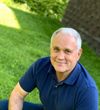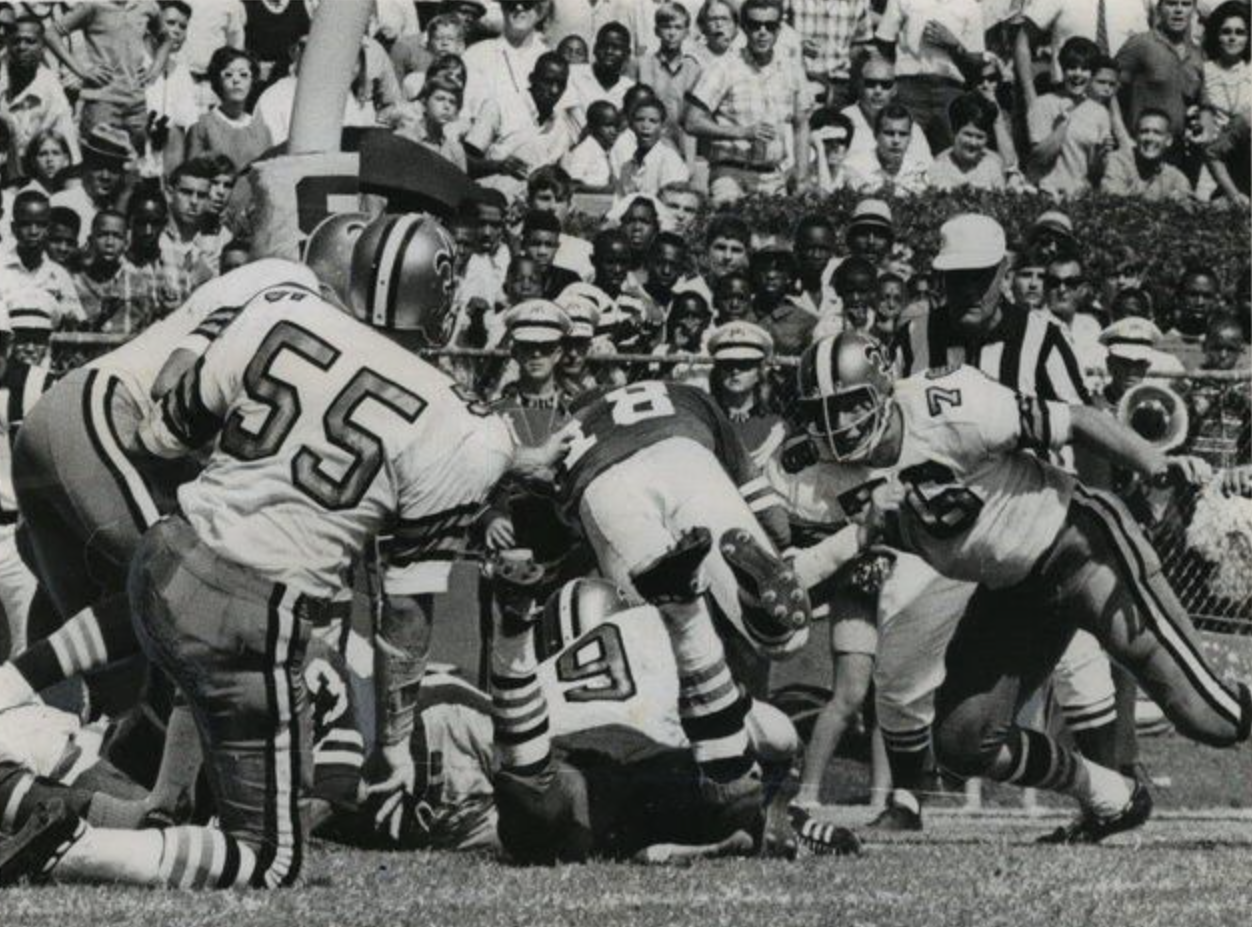Long ago, a Dallas Cowboys linebacker hit me hard. That's when I first got schooled in the art of blessing.
After I left active duty in the Navy, my late wife and I experienced significant marital conflict for the first time. We'd been married five years. Our son was already a fountain of joy. Yet, when I stood my last watch as a submarine officer and came home permanently from a life at sea, our path from bliss to bewilderment was short. I was adrift, humbled, and ready for answers. That's when the teacher I needed appeared.
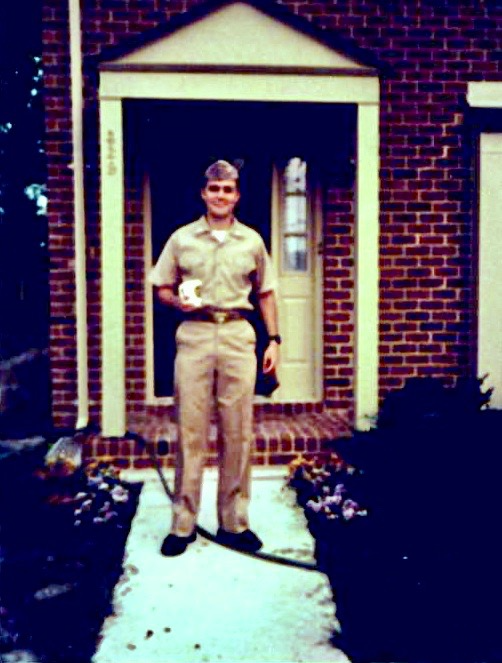
A friend invited me to one of those weekend seminars churches often sponsor. Such things were for those with real problems and not me, I thought, as I skimmed the flyer he handed me. But in a few bullets, men mentioned how it helped them be better husbands, and that hope grabbed hold of me and would not let me go. It was a men-only retreat. Defensive, expecting little but secretly hoping for the help I needed, I signed up.
Dave Simmons played for the Saints and the Cowboys before he became a pastor. As soon as he spoke, I relaxed. He talked to us in that humorous and challenging way men mentor men, or at least the way I'd experienced that on the sporting fields and in the Navy. Uncomfortable, enlightening, and encouraging. Inspiring us to be our best selves. When he hit me, I trusted him.
Dave walloped me with three truths:
- I was a jerk.
- I conceived the whole relationship thing entirely backward.
- I was inept at love.
How to Be a Jerk
On the first point, I hear the refrain resounding from family and friends, "I could have told you that." Yeah, but a student has to be ready to listen, and, as someone who had always succeeded, humility was a new thing for me.

Of course, Dave didn't say I was a jerk. We have to name that kind of truth to ourselves. Instead, Dave revealed an astounding truth: women are different from men. My self-assessment followed logically from that revelation.
Of course, I had already delighted in some of the differences between women and men. We named one fruit of that discovery after my brother. But until that moment, it has never occurred to me that those differences are providential.
When Dave spoke, I remembered the shock I had when visiting my parents when my younger brother moved out. When I walked into our childhood home, my mind was assaulted by lace and things that evoked the thought' lace' in my mind. The textures were different. The colors were different. Our citadel of boyhood was different. For all my life, I'd seen Mom, who had five sons, as just one of the boys. But that day, I realized she'd just been waiting for our masculine tide to retreat so her femininity could prevail. I was stunned: Mom was a girl!
I had never been taught to pay close attention to the differences between men and women and celebrate them as a gift. Beyond the obvious physical differences, that is. Mom always seemed to be just one of the guys, so homogeneity in responses to life always seemed to be the goal. Life in the Navy reinforced that. I didn't know better. That's my excuse, at least.
Dave spent more than an hour presenting the evidence of the many ways women are different than men. At first, I was comforted. Given how different we are, no wonder my wife was at times such a mystery to me!
But then an unsettling recognition arose. If all those differences between women and men are providential, then perhaps many of the differences between my wife and me were providential, too. If that were true, then maybe the conflict we'd been experiencing was due to my blindness to blessing.
It was a revelatory moment for me. I'd come home from sea, beat my chest, and declared in unsubtle ways that the king had returned to rule. My wife had done fine for years on her own, of course, but that fact avoided me. As we went about building a new life together, her responses to opportunities, challenges, possibilities, and threats were notably different than mine. It never occurred to me that those differences might be providential. In my arrogance and ignorance, I saw difference as defect. Conflict arose as I pushed her to respond to things as I do. I tried to turn my wife into a better man.
I would love to report that I quickly repented, and we lived happily ever after. But that's not what happened. Of course, I repented. I also learned to be moved by the beauty of her difference from me. I became a better husband. And we did share a long blessed life together until her death due to cancer.
But repentance from unhealthy behavior is different than being cleansed of its cause. The cause of my jerk-like action was a tacit hierarchical worldview that assumed my category's responses to events were normative. Such habits of thought are enculturated and thick. I’m married once again, and basking in bliss, but occasionally those old habits of thought pop up. Perhaps we never are cured of such distorted lenses but can only learn to limit their power over how we act.
How to Get Things Backward
The second way Dave hit me was the revelation that my understanding of relationships was backward. In my defense, I'd like to plea that I was only in my late 20s. I had not invested much energy in contemplating the role of relationships in our lives generally or my life in particular. Relationships just happened without much intentionality on my part beyond mustering the courage to ask for a date or volunteering for a shared mission. It never occurred to me to ponder how relationships fit into my efforts to construct a fruitful life.
Dave put up a flip chart that changed my life. I've shared the handout of that chart below. After some biblical reflection through which he derived his key concepts, he spoke of the life that actualizes God's dream for us. At the top of his chart, he named our key relationships - those with God, with our family, other Christians, and those who are not Christian. At the bottom of the chart, he listed "self" and three ways one experiences callings upon one's self - body, time, and capital. That is, we each experience a vocation to steward our finite bodies, time, and the tangible and intangible capital we accumulate in our lives.
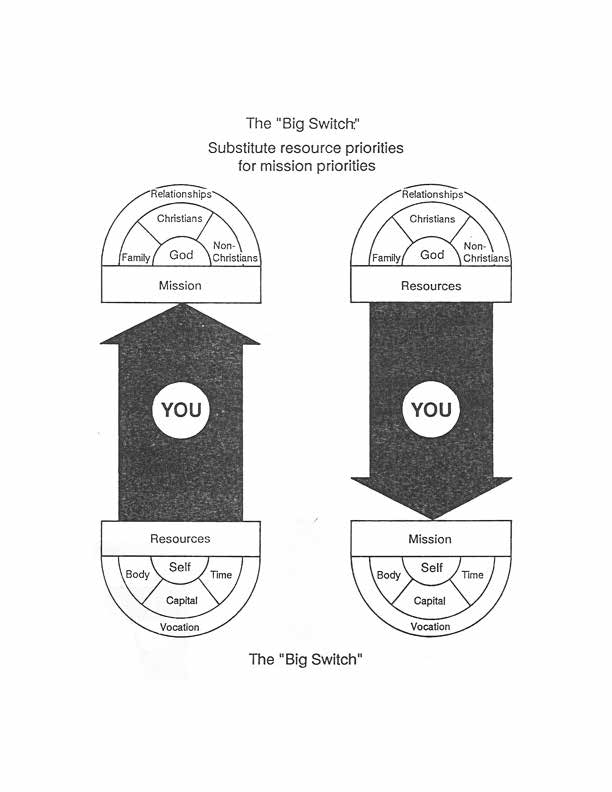
When we live as God teaches us to live, we view our critical relationships as our mission in life. Our mission is to live in holy friendship with God and each other, and so those relationships are our destination. Similarly, when we live as God teaches, we view those gifts of body, time, and capital as resources. The purpose of all things given in the forms of body, time, and capital is to be a means that draw us into and sustain those relationships that give our lives meaning.
Tragically, we confuse the purpose and priorities of these. We do a 'big switch." The big switch happens when we flip the connection between our vocations and our relationships. We begin to see our callings to nurture our bodies, time, and capital as our mission. Optimizing and maximizing ourselves become our destination, our priority. Our relationships with God and others are no longer the destinations of our lives but rather resources to be used in the service of optimizing our body, time, and capital. Tragically, we get the role of relationships entirely backward.
Some clues that the big switch is underway in a couple relationship are the complaints that "He doesn't make me happy," or "I'm bored in our relationship." The vector of one's vision points toward self as the mission priority rather than the other. In contrast, in a holy relationship, the vector of one's vision points toward the other. "How can I better invest my time to help my beloved flourish?" Discontent and boredom often vanish as soon as one turns from one's big switch.
That day, Dave gave me a wake-up call. I recognized that I had begun to see my wife as a resource whose purpose was to facilitate my wealth acquisition on our behalf. Although I did see us vaguely as a team, I did not yet see myself as one called to give of myself so that she might flourish. Over time, I recognized that I'd done the same with many of my relationships, especially at work. Of course, I quickly repented. Yet, repenting from such thick habits of thought requires a lifetime of calibrating one's aim. We are always vulnerable to the big switch.
How to Be Inept at Love
The third hit I took from Dave Simmons that day was discovering that I was inept in the art of blessing.
When he spoke of love, I thought I knew what he meant. I'd seen enough movies, read enough novels, written my share of love letters. But Dave made it clear that neither my hormone-powered, Hollywood-shaped passion nor my sometimes sappy sentimental box-of-chocolate affections were the love the Bible talks about. Love, he said, isn't something you feel. It's something you do.
Love is an action verb. Love is not itself a vector; love is kinetic. Love moves. Love does. Love unites with its destination. Feeling adoring things, thinking adoring thoughts - those may inspire acts that constitute love, but unexpressed by action, they don't count for much, like an incomplete pass, a song unsung, food unshared. Love gets off the couch and does what helps the other to flourish. Love is action.
That old linebacker taught me that I gave myself way too much credit for feeling the right thing, thinking the right thoughts. I thought those were sufficient. They weren't. I was inept at love.
The Art of Blessing
It's been decades since Dave Simmons shook my foundation by helping me see my immaturity in the art of love. I've learned a great deal since that day, mostly due to my prior commitment to the art of the turn. One of the things I've learned is that the 21st century American English word 'love' does not capture our calling's depth. That depth entails not just feeling good feelings, not just thinking good thoughts, and not just performing good acts. It involves actions that aim at a particular objective.
When Jesus teaches us to love our neighbors as ourselves, he is most likely not urging us to send them boxes of chocolates. When he makes it our life's mission to live with God and others in holy friendship, he is not charging us to think big thoughts about God or merely to tolerate our neighbor. On the contrary, he charges us to bless them. The particular action that love performs is to bless. To love well, I've learned, is to practice the art of blessing.
Of course, a blessing is what God does. To bless is a divine action. When we bless, we do so only derivatively. Because God is the source of blessings, when we say that we bless or a thing blesses, we are using a shorthand that means God, who is the source, is acting through us and other things to bless. I like to think of it in terms of channels: God makes us channels through which God works to bless. So when we practice the art of blessing, we are practicing the art of making ourselves available to God as channels through which God may bless.
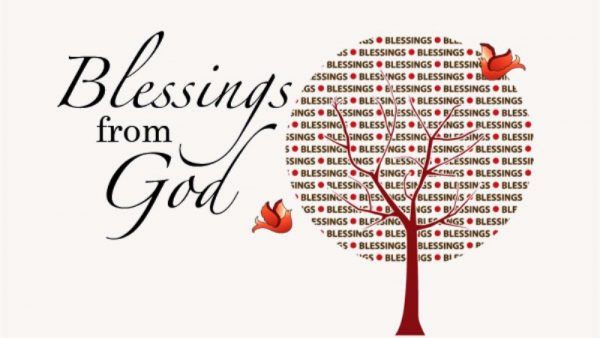
Biblically, the Hebrew word for "to bless" has the connotations of "to kneel or "to adore." If it is hard to get your head around the idea of God kneeling before or adoring us, see Phil 2:2-11 and John 13. Adoration of God's children is precisely why the Son humbles himself and kneels to wash our feet. Blessing is the act by which God, adoring us as his children, creates, sustains, and extends life.
When we think of blessing in this way, we see that the particular action that our love performs is that which sustains and extends life for the one we love. It's that action that kneels before them, honoring them as God's children, adoring them as God's beloved. Or, more accurately, it's our Spirit-led act whereby we offer ourselves to God as channels through which God does these things. It's getting ourselves out of the way so that God's love flows freely through us and washes over the one upon whom our gaze falls.
The art of blessing begins with the capacity to see the other neither as a resource nor through the distorting lens of hierarchy, but as a destination, a holy friendship. It entails the courage to offer oneself boldly as a channel through which God may heap blessings upon the other so that she might flourish. It involves confession of the many times and ways we are tempted to block God's use of us as a channel for blessing, especially when we hunger for such sustenance ourselves. And it entails the skill to discern the best action in each moment that will sustain and enrich the other's life. Like jazz, the art of blessing is most visible in our skillful improvisation, the creative ways we express God’s “Yes!” to the one before us.
Yet blessing is not just an art. It is the calling through which we are blessed. For when, over time, our heart's habit becomes such self-offering, our heart participates in the life of God whose character is such humble service. We share in the content of that life, which is peace.
